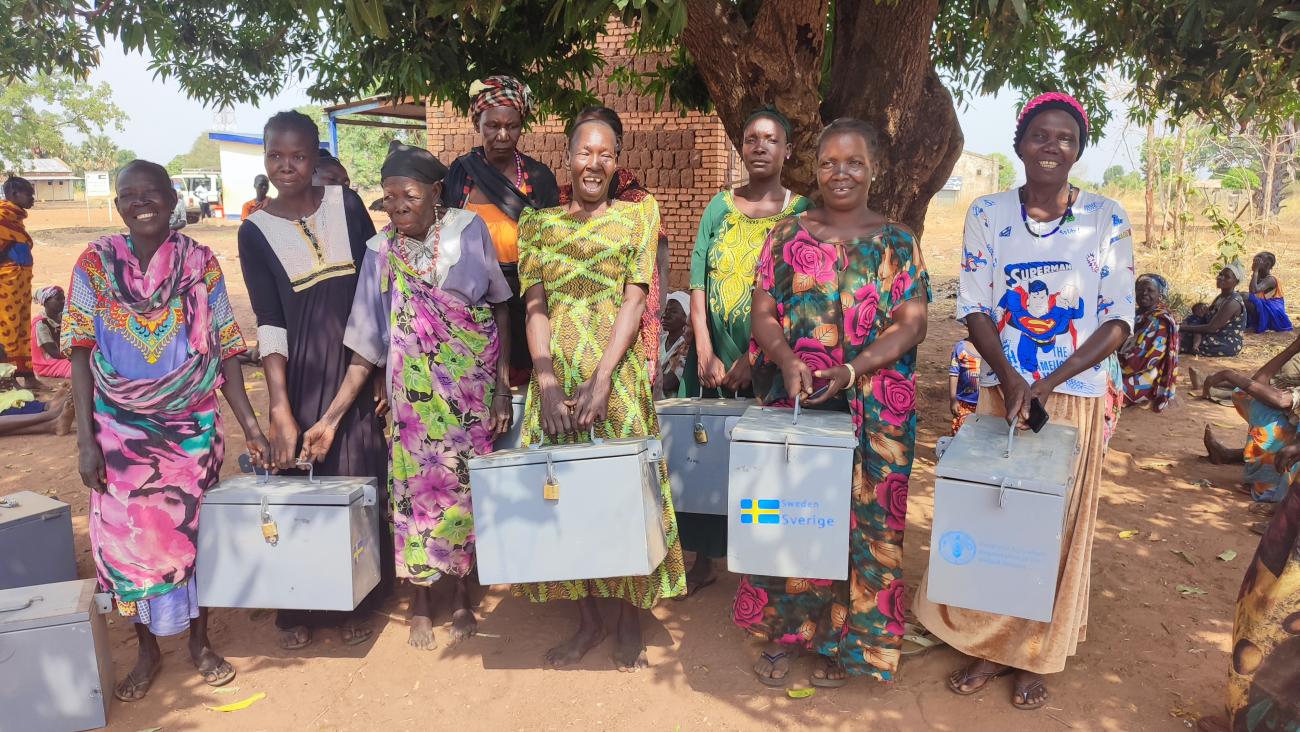Armed With Farming Skills, Women in Wau Fighting Hunger With Smiles

“We have been empowered by the training we received, it has helped us produce our own food, and now we are saving money,” said Ms. Dokunga.
Despite the arable land and favorable climate, subsistence farmer Umjima Kamal’s crops always fell short. Produce was never enough to feed and care for her family of eight children and had to often rely on handouts from humanitarian organizations for feeding supplements.
Ms. Kamal lives in Busere Boma, Baggari Payam of Wau County—Western Bahr El Ghazal State. Wau County in the north-western part of South Sudan lies within the western plains zone where groundnuts, sesame, and sorghum are the main crops of livelihood.
But economic hardships and the effects of the civil war impacted the ability of farmers to produce enough food. As a result, this has led to a change in food insecurity levels in the County, leaving many families impoverished.
The latest Integrated Food Classification Phase post-harvest projection period of December 2022 to March 2023 estimated that at least 6.31 million people (51.0% of the population) will likely face Crisis (IPC Phase 3) or worse acute food insecurity.
Across South Sudan, millions of households remain acutely food insecure due to extensive crop and livestock production losses, the significant loss of other livelihood assets, repeated household displacements, and the erosion of income-generating activities caused by floods, conflict, and poor macroeconomic conditions.
This is despite global efforts to end hunger, achieve food security and improve nutrition and promote sustainable agriculture by 2030.
The answer for subsistence farmer Ms. Kamal was not to rely on relief supplies but to grow her own food.
Life started changing for the 48-year-old mother of eight in November 2021, when the United Nations Food and Agriculture Organization (FAO) began implementing a resilience project.
Along with other locations in Wau County, Busere Boma where Ms. Kamal lives was chosen as one of the project areas.
Funded by the Swedish International Development Agency (SIDA), the three-year project aims to improve resilient livelihoods through food and nutrition security of vulnerable communities, especially women-headed households in Wau and Torit Counties of South Sudan.
Through a partner nongovernmental organization—World Concern, Ms. Kamal is one of 420 individuals in Baggari Payam who have benefited from the resilient project.
She received training on how to do mixed planting, and modern farming techniques to increase their food production. Ms. Kamal and her group members applied the techniques that they learned and saw immediate results.
“We planted more than two fedans of cowpeas and produced up to 20 bags of 50-kilogram each, which we sold and kept some for seeds,” Ms. Kamal said with a smile.
In addition to food production, the women are involved in vegetable production, agro-processing, and Village Savings and Loan Association (VSLA) activity.
"We did not know how to plant crops that can produce better results. We were relying on our traditional ways. But right now, we are able to plant and produce more using the knowledge and skills we gained from the training,” said Ms. Kamal.
Like Ms. Kamal, 61-year-old grandmother, Maria Dokunga is excited of what women in Busere are engaged in to fight hunger.
Grouped into 10, every week each member contributes some money, pooled in a metallic box safely kept by one of their members. At the end of the month, they gather and give the funds to one member, until every member gets their share.
“We have been empowered by the training we received, it has helped us produce our own food, and now we are saving money,” said Ms. Dokunga.
"The resilience project has opened the eyes and has provided an opportunity for this community to rely on their own food production,” said Mr. Elia Joseph Mosika who is the field Food Security and Livelihoods Field Officer for World Concern organization, supported by FAO.
“We have to fight hunger and for us to fight hunger we have to work hard. We have to know how to produce food from the soil that God has given us.”
“Through this project, we are developing these communities to depend on themselves and produce enough food for local consumption and fight malnutrition at the household level,” Mr. Elia added.
The project is a two-year project that started in June 2022 and runs till 2024. It is implemented in Western Bahr EL Ghazal and Torit State, targeting more than 5,500 households.
FAO’s resilience in agriculture activities are part of the United Nations Country Team Cooperation Framework, to support the Government of South Sudan improve food security and recovering local economies.
According to the 2021 UN Country Annual Results Report, at least 30,000 vulnerable smallholder farmers like Kamal were trained in livelihood development, post-harvest management, and market access.
An additional 990,000 households were supported with various forms of agriculture assistance under the Emergency Livelihoods and Resilience Programme.
For Ms. Kamal, her community is now able to produce its own food. “Given the results we are seeing, there will be a big change in terms of food production and income generation in our community of Busere,” she said.





